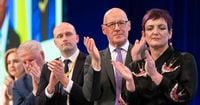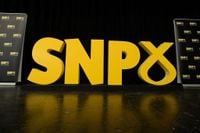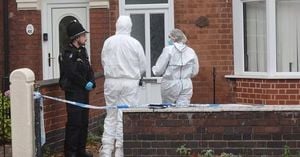At the heart of Scottish politics, the debate over independence has once again surged to the forefront, with First Minister John Swinney staking his leadership—and perhaps his party’s future—on the promise of a new referendum. As the Scottish National Party (SNP) gathered in Aberdeen for its annual conference in mid-October 2025, Swinney made clear that the precedent set in 2011, when the SNP won an outright majority at Holyrood, should serve as the trigger for another vote on Scotland’s future.
"Precedent is on my side," Swinney told BBC Scotland's The Sunday Show, a refrain he repeated throughout the conference. He pointed to the events of 2011, when the SNP’s electoral triumph—securing 69 out of 129 seats—paved the way for the 2014 independence referendum. That historic vote, held under the Edinburgh Agreement signed by then First Minister Alex Salmond and Prime Minister David Cameron, resulted in Scotland choosing to remain in the United Kingdom by a margin of 55.3% to 44.7%.
Swinney’s strategy, endorsed by party delegates in Aberdeen on October 11, 2025, is ambitious: make the May 2026 Scottish Parliament election a de-facto poll on independence. If the SNP wins a majority, Swinney argues, the UK government should concede to a second referendum. “This is what happened in 2011. And precedent is a substantial factor in legal consideration of the right of the people of Scotland to decide their own future,” he said, emphasizing the legal and political weight of such a result.
But the road ahead is anything but straightforward. UK Labour’s newly installed government, led by Prime Minister Keir Starmer, remains firmly opposed to granting another referendum. Scottish Secretary Douglas Alexander, who replaced Ian Murray in July 2024, was unequivocal: “Labour does not support independence or another referendum. That’s the mandate on which I was elected and I will adhere to that mandate.” On The Sunday Show, Alexander accused Swinney of using the independence issue to “divert attention from his horrifically bad record on Scotland’s public services.”
This criticism was echoed by others across the political spectrum. Scottish Conservative deputy leader Rachael Hamilton accused Swinney of “desperately pushing his obsession with independence” to distract from what she described as the SNP’s failures in government, particularly in health, education, and economic growth. Liberal Democrat MSP Willie Rennie was similarly scathing, suggesting that talk of independence was a “crutch” for a party that had failed to deliver after nearly two decades in power.
Still, Swinney remains undeterred. In his keynote speech at the conference, he sought to fire up the party base by drawing a sharp contrast between Scotland and what he called Westminster’s “race to the right.” He condemned decades of “failed Thatcherite economics,” blaming them for rising costs of essentials like energy and food. “On Westminster’s watch, the basic essentials of life—energy, food and more—are becoming more and more expensive,” he told delegates. “Today I believe it will be revulsion at Westminster’s race to the right that will change Scotland’s status again. From a so-called devolved nation, to what we can be: a modern, outward looking, inclusive compassionate country. Not a devolved nation. But the world’s newest nation state.”
Swinney’s message was clear: only independence could deliver the “fresh start Scotland needs.” He argued that living standards in the UK had “flatlined” for 15 years and that the promised improvements from a change of government at Westminster “have simply not happened.” For those worried about standards of living, Swinney insisted, “this election should be about independence. Because, under the United Kingdom, people’s standard of living has been flat as a pancake for 15 years.”
Backing Swinney’s approach was former First Minister Nicola Sturgeon, who made a high-profile appearance at the conference, signing copies of her memoir. Sturgeon, who plans to step down as an MSP next year, acknowledged that achieving a majority would be “an exceptionally hard task.” But, she added, “If you don’t set your sights high, you don’t deliver big things.” Sturgeon also expressed confidence in Swinney’s leadership, telling The Scotsman, “I’ve known John Swinney for a long, long time and if he says he has a secret plan, he has a secret plan. I’ve got confidence in him to deliver it.”
There are hints that Swinney’s “secret plan” may include legal tactics. He has suggested that if the UK government continues to deny a referendum, the SNP could pursue a judicial review, leveraging the precedent of 2011 as a “substantial factor in legal consideration.” When pressed by BBC Scotland about his tactics, Swinney replied, “Of course I do. The first of those tactics is to make sure the SNP wins the election and wins a majority of SNP MSPs in the Scottish Parliament.”
Some in the SNP are already looking beyond the 2026 election, speculating that if Labour suffers setbacks in Scotland and Wales, the political landscape in London could shift yet again. Swinney’s supporters believe that a clear majority at Holyrood would strengthen his hand, whether at the negotiating table or in the courts.
Yet, the opposition is not backing down. Jackie Baillie, Scottish Labour’s deputy leader, dismissed Swinney’s rhetoric, insisting, “John Swinney can make all the speeches he wants, but the people of Scotland won’t be fooled—they know after 18 years of SNP failure that nothing will change. Our NHS is on its knees, with record waiting lists and thousands forced to turn to the private sector, violence in schools is rising, and the housing emergency is worsening by the day.”
Meanwhile, the SNP remains ahead of Labour in the polls as of October 2025, but senior party figures acknowledge that reaching the benchmark of 65 MSPs is a formidable challenge. The party’s campaign will need to motivate activists across the country to achieve what Swinney has described as a “much stronger position” for negotiating Scotland’s future.
Deputy SNP leader Keith Brown, speaking at the conference, also took aim at the rise of the far right in UK politics, criticizing figures like Nigel Farage and emphasizing the SNP’s commitment to inclusivity and support for women in politics. Brown announced the launch of the “Lead the Change” program, aimed at mentoring women interested in a political career, reflecting concerns about the increasingly toxic political climate.
As the countdown to the 2026 Holyrood election begins, the stage is set for a high-stakes contest that could determine not just the future of the SNP, but the constitutional fate of Scotland itself. Whether precedent, legal tactics, or political momentum will prevail remains to be seen, but for now, the debate over independence is very much alive—and as heated as ever.






